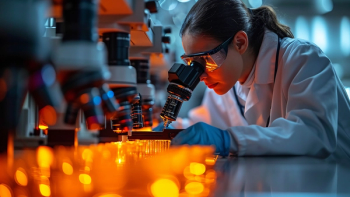We live in an era where science and research continually debunk previous beliefs. New technologies enable us to view the world, and in my field, diseases, with a new lens.In my previous career, for twenty years, I was a pulmonary and critical care physician and the medical director of a medical intensive care unit (ICU) in Philadelphia. While treating patients, we would often be treating the symptoms or providing supportive therapies that are somewhat effective but do not address the underlying disease mechanism. Examples of such are inflammatory and autoimmune diseases that were often treated with nonspecific broad immunosuppression or toxic therapies with significant side effects.
How is precision medicine impacting the pharma industry?
Key Takeaways
- Advances in science and technology have made it possible to not only identify the pathogenic causes of autoimmune and inflammatory diseases, but we now have the ability to discriminately remove the offending cause of a disease and treat the disease at its root.
- Researchers are seeing a paradigm shift in how they can design and discover new treatments.
- Another exciting aspect is the potential to develop therapies faster.
However, advances in science and technology have made it possible to not only identify the pathogenic causes of autoimmune and inflammatory diseases, but we now have the ability to discriminately remove the offending cause of a disease and treat the disease at its root.
For two decades I treated patients and educated the new generation of physicians, nurses, and allied health professionals in my job as a clinician-educator. After the height of the COVID pandemic, I wanted to pursue new challenges and opportunities and made the switch to the pharmaceutical industry, a decision even I would not have imagined even a few months before. However, I am delighted now to be part of a team that is developing a technology that can specifically remove the pathogenetic protein that causes a disease. We at Biohaven can capitalize on this technology to tackle diseases such as IgA nephropathy, Graves’ disease, and peripartum cardiomyopathy. As an Executive Medical Director at Biohaven, I am applying my clinical knowledge and curiosity as a physician, combined with my experience working with multi-professional teams in the ICU to develop new therapeutic solutions for difficult-to-treat diseases.
Precision Therapy
The term precision therapy is often used to describe personalized therapeutic practices. What excites me in my current role at Biohaven is how treatments are being developed that transform precision medicine to a whole new level. We are seeing a paradigm shift in how we can design and discover new treatments.
I am proud to help support an exciting therapeutic strategy that uses extracellular protein degradation to identify proteins such as autoantibodies that are the underlying cause of a disease and remove them by leveraging the body’s natural senescent protein removal mechanism. By rapidly and selectively removing pathogenic proteins while leaving the healthy immune system intact, targeted protein degradation therapies offer the promise of next generation precision immunology. At Biohaven, we are leveraging the capabilities of our extracellular protein degrader platform to rapidly generate and advance multiple degrader candidates through clinical development for diseases with limited or no treatment options. So, we have the ability to apply this science broadly, whether it be autoimmune diseases, kidney disease, or cancer.
Another exciting aspect is the potential to develop therapies faster. Research, formulation, and trials that would typically take 6 – 10 years can now be completed in a fraction of the time thanks to the expertise and execution of the research and development team and clinical operations teams at Biohaven. This is crucial for rapid delivery of these treatments to patients who need them the most.
In my current role, I am involved in early phase clinical trials. Once the research and development team identifies a potential drug candidate, our early clinical drug development team works to safely and efficiently transition the drug to a first-in-human clinical trial.
If someone had asked me five years ago what path I expected my career to take, I would not have guessed I would be in the pharmaceutical industry, but I am glad I have made the transition from clinician-educator to medical director in drug development. I have been fortunate to find a new role where my passions align with my prior experience to be part of a team that finds new therapies for diseases with unmet needs, and fulfil my duty to help patients. As fast as science can identify underlying mechanisms of diseases, I’m so excited to be a part of efforts to address the underlying cause of the disease and change the paradigm to find more effective and safer therapies for patients.





